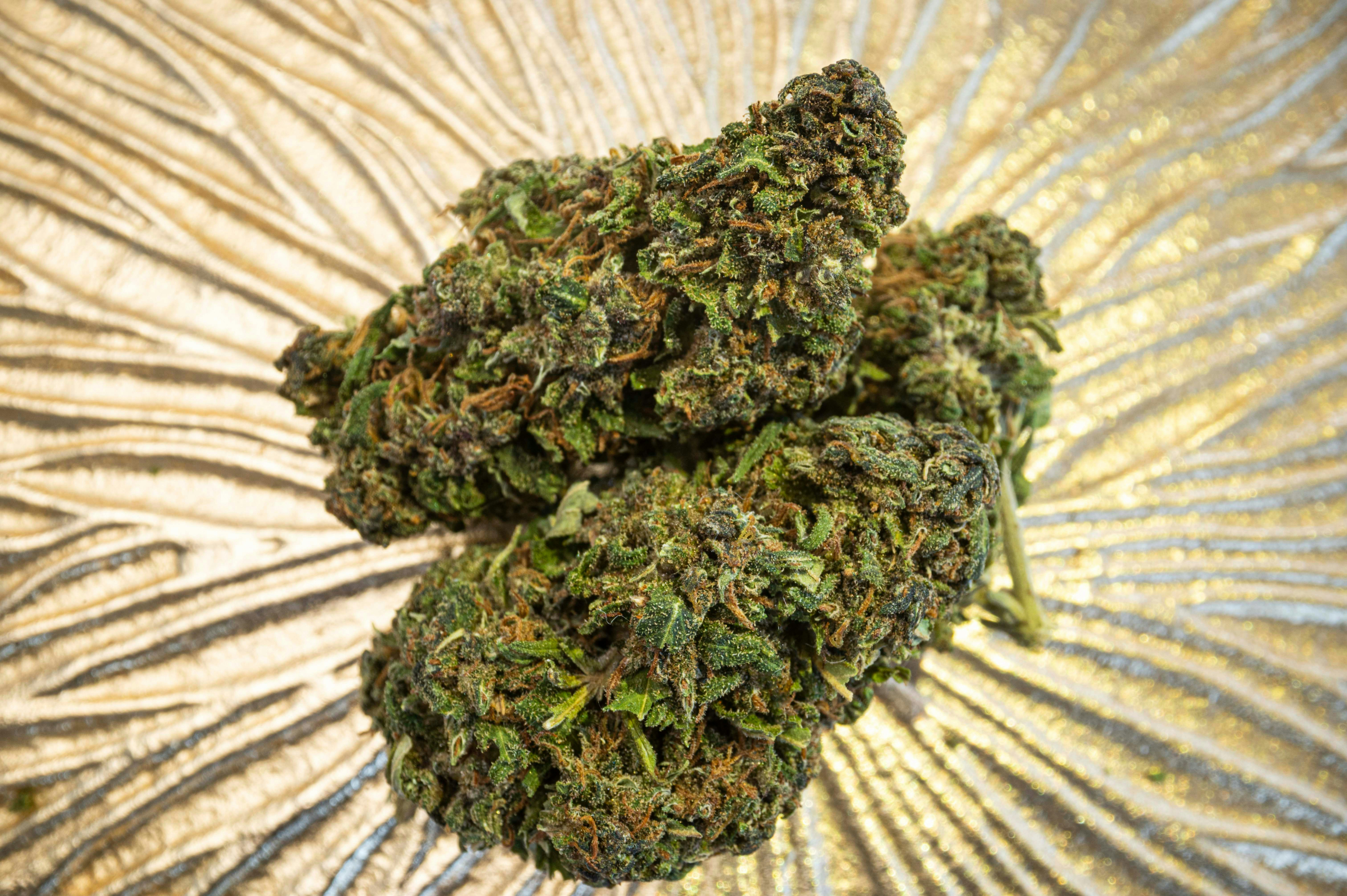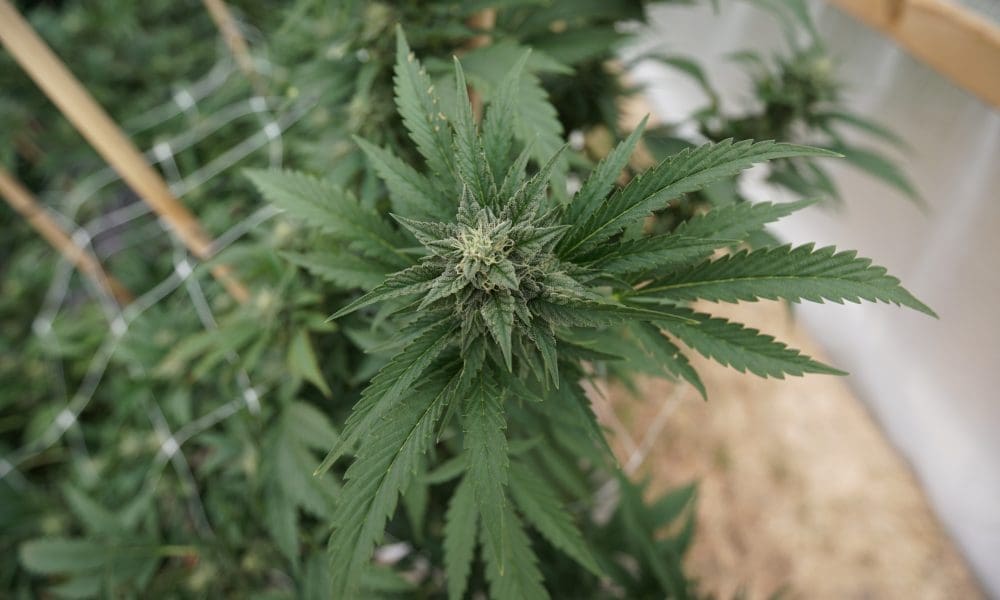featured
Senators Advance Bill Continuing Medical Marijuana Protections And Omitting House Proposal To Block Rescheduling
Published
2 days agoon

A Senate committee has approved a spending bill that would maintain protections for states with medical marijuana programs, while omitting a separate proposal included in the House version of the annual appropriations legislation that would prevent the Justice Department from rescheduling cannabis.
The Senate Appropriations Committee on Thursday passed the 2026 spending legislation covering Commerce, Justice, Science, and Related Agencies (CJS), with the GOP-controlled panel agreeing to again extend a longstanding rider that prevents DOJ from interfering in the implementation of state-level medical marijuana laws.
However, unlike the House version that advanced out of committee in that chamber on Tuesday, the base bill does not include provisions that would bar the Justice Department from rescheduling cannabis amid the ongoing process to enact that reform that was initiated under the Biden administration.
For reasons that are uncertain, however, the medical marijuana protections section omits Nebraska from the list of covered states with cannabis programs in place.
SEC. 531. None of the funds made available under this Act to the Department of Justice may be used, with respect to any of the States of Alabama, Alaska, Arizona, Arkansas, California, Colorado, Connecticut, Delaware, Florida, Georgia, Hawaii, Illinois, Indiana, Iowa, Kentucky, Louisiana, Maine, Maryland, Massachusetts, Michigan, Minnesota, Mississippi, Missouri, Montana, Nevada, New Hampshire, New Jersey, New Mexico, New York, North Carolina, North Dakota, Ohio, Oklahoma, Oregon, Pennsylvania, Rhode Island, South Carolina, South Dakota, Tennessee, Texas, Utah, Vermont, Virginia, Washington, West Virginia, Wisconsin, and Wyoming, or with respect to the District of Columbia, the Commonwealth of the Northern Mariana Islands, the United States Virgin Islands, Guam, or Puerto Rico, to prevent any of them from implementing their own laws that authorize the use, distribution, possession, or cultivation of medical marijuana.
In another departure from the House bill, the Senate proposal does not include additional language to make it so the Justice Department could still enforce a section of U.S. code that calls for increased penalties for distributing cannabis within 1,000 feet of an elementary school, vocational school, college, playground or public housing unit.
The CJS bill would also continue to provide protections for state industrial hemp programs.
SEC. 530. None of the funds made available by this Act may be used in contravention of section 7606 (‘‘Legitimacy of Industrial Hemp Research’’) of the Agricultural Act of 2014 (Public Law 113–79) by the Department of Justice or the Drug Enforcement Administration.
Advocates remain concerned about the House language that would restrict DOJ from rescheduling cannabis, but the fact that it was not incorporated into the base bill for the Senate CJS legislation likely diminishes the chances it will ultimately be enacted when the final package is delivered to the president’s desk.
GOP senators have separately tried to block the administration from rescheduling cannabis as part of a standalone bill filed in 2023, but that proposal did not receive a hearing or vote.
Meanwhile, the Drug Enforcement Administration (DEA) recently notified an agency judge that the marijuana rescheduling process remains stalled under the Trump administration.
It’s been over six months since DEA Administrative Law Judge (ALJ) John Mulrooney temporarily paused hearings on a proposal to move cannabis to Schedule III. And in a joint report to the judge submitted earlier this month, DEA attorneys and rescheduling proponents said they’re still at an impasse.
The Senate is poised to take an initial step toward confirming President Donald Trump pick to lead DEA next week—a development that many cannabis industry observers believe is necessary for the stalled marijuana rescheduling process to proceed.
Notably, while the nominee, Terrance Cole, has said that examining the rescheduling proposal would be “one of my first priorities” if he’s confirmed for the role, he has refused to say what he wants the result to be and has in the past made comments expressing concerns about the health effects of cannabis.
For the time being, any action on the proposed rule to reschedule marijuana is evidently contingent on DEA Acting Administrator Robert Murphy. More likely, according to some, is that it will not move forward until a permanent DEA administration is confirmed.
Murphy’s appointment as acting administrator wasn’t widely publicized, but he’s replaced Derek Maltz—who subscribes to the “gateway drug” theory for marijuana—in the role.
DEA Administrative Law Judge (ALJ) John Mulrooney initially agreed to delay the rescheduling proceedings after several pro-reform parties requested a leave to file an interlocutory appeal amid allegations that certain DEA officials conspired with anti-rescheduling witnesses who were selected for the hearing.
Originally, hearings on the proposed rescheduling rule were set to commence on January 21, but those were cancelled when Mulrooney granted the appeal motion.
The appeal came after the judge denied a motion that sought DEA’s removal from the rescheduling proceedings altogether, arguing that it is improperly designated as the chief “proponent” of the proposed rule given the allegations of ex parte communications with anti-rescheduling witnesses that “resulted in an irrevocable taint” to the process.
Meanwhile, the Justice Department told a federal court in January that it should pause a lawsuit challenging DEA’s marijuana rescheduling process after Mulrooney canceled the hearings.
Also in January, Mulrooney condemned DEA over its “unprecedented and astonishing” defiance of a key directive related to evidence it is seeking to use in the marijuana rescheduling proposal.
At issue was DEA’s insistence on digitally submitting tens of thousands of public comments it received in response to the proposed rule to move cannabis to Schedule III.
Mulrooney hasn’t been shy about calling out DEA over various procedural missteps throughout this rescheduling process.
For example, in December he criticized the agency for making a critical “blunder” in its effort to issue subpoenas to force Food and Drug Administration (FDA) officials to testify in hearings—but he allowed the agency to fix the error and ultimately granted the request.
Relatedly, a federal judge also dismissed a lawsuit seeking to compel DEA to turn over its communications with the anti-cannabis organization.
Mulrooney had separately denied a cannabis research company’s request to allow it to add a young medical marijuana patient and advocate as a witness in the upcoming rescheduling hearing.
Also, one of the nation’s leading marijuana industry associations asked the judge to clarify whether it will be afforded the opportunity to cross-examine DEA during the upcoming hearings on the cannabis rescheduling proposal.
Further, a coalition of health professionals that advocates for cannabis reform recently asked that the DEA judge halt future marijuana rescheduling hearings until a federal court is able to address a series of allegations they’re raising about the agency’s witness selection process.
Separately, the House Appropriations Committee on Tuesday approved a spending bill that contains provisions to block the Justice Department from rescheduling marijuana.
The rescheduling proceedings have generated significant public interest. While moving marijuana to Schedule III wouldn’t federally legalize it, the reform would free up licensed cannabis businesses to take federal tax deductions and remove certain research barriers.
—
Marijuana Moment is tracking hundreds of cannabis, psychedelics and drug policy bills in state legislatures and Congress this year. Patreon supporters pledging at least $25/month get access to our interactive maps, charts and hearing calendar so they don’t miss any developments.![]()
Learn more about our marijuana bill tracker and become a supporter on Patreon to get access.
—
Meanwhile, two GOP senators introduced a bill in February that would continue to block marijuana businesses from taking federal tax deductions under Internal Revenue Service (IRS) code 280E—even if it’s ultimately rescheduled.
Beyond the hearing delays, another complicating factor is the change in leadership at DEA under the Trump administration.
U.S. Department of Health and Human Services (HHS) Secretary Robert F. Kennedy Jr. was previously vocal about his support for legalizing cannabis, as well as psychedelics therapy. But during his Senate confirmation process in February, he said that he would defer to DEA on marijuana rescheduling in his new role.
Separately, former Rep. Matt Gaetz (R-FL) was reportedly photographed reviewing a document that appears to be a draft contract to provide services—including “administration-related guidance”—to a firm affiliated with the major marijuana company Trulieve. The visible portion of the document describes a lucrative bonus if a certain “matter resolves,” with an “additional ‘Super Success Fee’” for other “exclusive policy remedies.”
Last month, the former congressman reiterated his own support for rescheduling cannabis—suggesting in an interview with a Florida Republican lawmaker that the GOP could win more of the youth vote by embracing marijuana reform.
Gaetz also said last month that Trump’s endorsement of a Schedule III reclassification was essentially an attempt to shore up support among young voters rather than a sincere reflection of his personal views about cannabis.
A survey conducted by a GOP pollster affiliated with Trump that was released in April found that a majority of Republicans back a variety of cannabis reforms, including rescheduling. And, notably, they’re even more supportive of allowing states to legalize marijuana without federal interference compared to the average voter.
Meanwhile, Trump picked former Florida Attorney General Pam Bondi (R) to run DOJ, and the Senate confirmed that choice. During her confirmation hearings, Bondi declined to say how she planned to navigate key marijuana policy issues. And as state attorney general, she opposed efforts to legalize medical cannabis.
Amid the stalled marijuana rescheduling process that’s carried over from the last presidential administration, congressional researchers recently reiterated that lawmakers could enact the reform themselves with “greater speed and flexibility” if they so choose, while potentially avoiding judicial challenges.
Meanwhile, a newly formed coalition of professional athletes and entertainers, led by retired boxer Mike Tyson, sent a letter to Trump on Friday—thanking him for past clemency actions while emphasizing the opportunity he has to best former President Joe Biden by rescheduling marijuana, expanding pardons and freeing up banking services for licensed cannabis businesses.

Author: mscannabiz.com
MScannaBIZ for all you Mississippi Cannabis News and Information.
You may like
-


Cannabis farm worker in California dies following a chaotic federal immigration raid
-


Looks Don’t Get You High. Smokeability Does.
-


Missouri Marijuana Regulators Revoke License Of Concentrate Manufacturer Involved In Massive Product Recall
-


Suspects rob Paseo District marijuana dispensary
-


Malta Limits Historic Marijuana Legalization Law, Sending Threat Letters To Consumers Over ‘Nuisance’ Odors
-


Gang uses drone to find and steal cannabis farms

In today’s cannabis scene, “premium” and “high-grade” get thrown around so casually that they’ve lost all meaning. Anything with a little frost and a decent nose is getting labeled top-shelf, no matter how it actually smokes.
That’s the problem.
When every bag is called fire, even when it burns like mids, the entire culture suffers. Consumers get duped into paying premium prices for a mediocre product. New growers lose motivation to push the limits. Standards get stuck. The real heat gets buried under hype.
Somewhere along the way, the cannabis market started prioritizing how weed looks on Instagram over how it smokes. Bag appeal, frosty pics, loud branding — all of it’s been elevated to a point where looks have overtaken experience. But looks don’t have anything to do with smokeability. Photos don’t tell you how clean the smoke is.
Here’s the reality: True quality is how it smokes. How it hits the lungs, how it burns, how it lingers. That’s the only metric that matters.
Right now? There are crews out there putting out “clean mids” that smoke better than half the overpriced, so-called premium in Mylar bags.
If this culture wants to evolve, the standard can’t be set by the lens. It’s got to be set by the lungs. Every time.
— Submitted by Walter Bridger, Mount Maunganui, NZ.
About High Thoughts: Short Hits From the Community
Welcome to High Thoughts, a new series from High Times featuring quick takes, stray thoughts, and stoned wisdom from our global cannabis community. These aren’t polished essays or sponsored posts — just real voices from real people who live this culture every day.
In this edition, Walter Bridger, a third-generation cannabis advocate from New Zealand and founder of Trap Talk, reminds us why smokeability still matters more than bag appeal. Looks don’t get you high. Lungs do.
This article is from an external, unpaid contributor. It does not represent High Times’ reporting and has not been edited for content or accuracy.
Photo by Chiara David on Unsplash

Author: mscannabiz.com
MScannaBIZ for all you Mississippi Cannabis News and Information.
featured
Missouri Marijuana Regulators Revoke License Of Concentrate Manufacturer Involved In Massive Product Recall
Published
10 hours agoon
July 20, 2025
“The department enforces its regulations to uphold the Missouri Constitution and ensure safe access to marijuana product at our licensed facilities.”
By Rebecca Rivas, Missouri Independent
A Springfield marijuana manufacturer central to Missouri’s largest cannabis product recall last year had its license revoked Thursday.
State regulators found the company, C&C Manufacturing LLC, created a distillate—or THC concentrate that produces a high in edibles and vape pens—using unregulated THC.
Other manufacturers statewide bought the distillate and used it to make numerous brands of vapes, edibles or pre-rolled joints, including Rove, Zen and Packarillos. A total of 135,000 products were recalled last year.
After the state issued the company a notice of pending revocation in January, regulators discovered C&C had “removed or destroyed all of the marijuana product in its facility as well as its video records,” according to the Missouri Division of Cannabis Regulation’s Thursday press release announcing the revocation.
“C&C’s use of unregulated THC to create marijuana products, numerous violations of rule, and destruction of product and records in direct violation of DCR orders demonstrates clear disregard for law at the expense of health and safety and has no place in Missouri’s regulated market,” said Amy Moore, the division’s director.
Matt Cummins, CEO of GOAT Extracts, is listed as the designated contact for the facility and a number of GOAT products are on the list. The Independent reached out to the designated contact number listed on the state’s facility database for comment and did not receive a response.
Some of the unregulated THC involved using “chemical modification,” the release states. That could mean C&C bought a THC concentrate that had been made by converting hemp-derived CBD into THC using a chemical conversion process. Then the company used that to make its distillate, a process that had been used in another major recall case involving the company Delta Extraction.
The recall time frame is quite wide. It goes back to last year when companies were trying to ramp up for recreational marijuana sales.
Nick Rinella, CEO of Hippos Cannabis, told The Independent last year that his company unknowingly bought some of C&C’s distillate in 2023 when Hippos’ own supply was low at its grow and manufacturing facilities.
But he emphasized that this recall is not because of lack of testing. Once Rinella and other manufacturers got the distillate and made products with it, those were “properly tested” before they went on the shelves, he said.
“We can feel confident that those products were safe,” he said last August. “They passed all the tests, and we have some of the most stringent tests in the country.”
During the recall announcement last year, the division said no adverse reactions involving recalled products have been reported.
The division’s Thursday release states that the violations leading to C&C’s license revocation are “numerous.”
It states the company violated state and federal law by transporting Missouri marijuana outside of the state. C&C also sold marijuana products in Missouri that did not originate from Missouri marijuana and “failed to preserve records and marijuana products as directed by DCR’s prior directives.”
“The department enforces its regulations to uphold the Missouri Constitution,” Moore said, “and ensure safe access to marijuana product at our licensed facilities.”

Author: mscannabiz.com
MScannaBIZ for all you Mississippi Cannabis News and Information.
featured
Malta Limits Historic Marijuana Legalization Law, Sending Threat Letters To Consumers Over ‘Nuisance’ Odors
Published
14 hours agoon
July 20, 2025
“We’re back to punishing plants and people instead of fixing the real problems, which are housing density, social stigma and lack of safe venues.”
By Felipe Neis Araujo, Filter
In late 2021, Malta became the first European country to legalize marijuana possession for adult use. Anyone over 18 could keep up to seven grams on their person and up to 50 grams at home, plus grow up to four plants. The act also established a regulatory framework that included cultivation and distribution by licensed nonprofits known as Cannabis Harm Reduction Associations (CHRAs).
Portugal and other countries had decriminalized personal possession, but it was still a civil violation. Malta’s reform was praised as a pragmatic, public health‑oriented pivot that would siphon revenue away from drug-trafficking groups and spare people the burden of a criminal-legal record. Public consumption remained banned, but people could smoke cannabis at home.
Four years later, the island nation’s governing Labour Party has changed its tune.
In May, the Parliament of Malta unanimously approved Bill 128, which sets a €235 fine for public consumption of non-medical cannabis—including “in any place where the [odor] causes a nuisance to third parties.”
Previously this had only applied to public consumption, but it now includes people smoking in the privacy of their home—if a neighbor complains about the smell. A free hotline has been set up to receive complaints. In July, warning letters began to arrive.
“A lot of people were smoking on their balconies and annoying people who lived above them,” Joey Reno Vella, the executive chairperson of the Authority for the Responsible Use of Cannabis (ARUC), told the Times of Malta earlier in 2025.
The law states that no “criminal proceedings…shall be taken except at the request or with the authorization of the Authority on the Responsible Use of Cannabis.” But it becomes a court matter if the fine goes unpaid—and then what? As time goes on, how will ARUC handle people who are fined repeatedly and cannot pay?
“We’re back to punishing plants and people instead of fixing the real problems, which are housing density, social stigma and lack of safe venues,” Maltese activist and former ARUC employee Karen Mamo told Filter at an academic drug policy conference in June. CHRA have been forbidden from operating on‑site lounges.
The policy U‑turn did not come out of nowhere. Policing remained part of legalization from Day One, targeting young people who smoked outside. Police officers pounced on those using cannabis on beaches or rooftops. Conservative lobbyists and the Catholic Church spread a narrative about Malta becoming the new Amsterdam.
In 2023, House of Representatives Deputy Speaker Claudette Pace told members of Parliament that she’d met a visually impaired man whose guide dog had gotten high from second-hand smoke. In 2024, the government launched a high-profile Responsible Cannabis Use campaign. Warnings about the fine for smoking in public or near minors appeared on billboards and Instagram posts.
The message was clear: Cannabis is still a threat to children and public order. These tired tropes ignore the fact that adults can drink alcohol and smoke cigarettes while holding a a child in their lap, and apparently not pose the same risk.
In the island’s densely populated apartment blocks, the issue of odor complaints emerged as a way to effectively roll back the 2021 protections.
In 2011, Malta saw an historic cannabis criminalization protest led by David Caruana, who was facing charges for growing cannabis plants on his balcony; cultivation was considered to be drug trafficking, even in personal-use quantities. Advocates highlighted the case of Daniel Holmes and Barry Lee, who in 2006 had been arrested for growing five plants. Lee died by suicide while awaiting trial; Holmes was serving a 10.5-year sentence. He was released in 2018.
NGOs such as ReLeaf Malta rallied public support and pushed politicians to imagine something better. This lobbying gained traction after 2015’s Drug Dependence Act nominally decriminalized personal possession, but left police free to detain users for 48 hours. Advocates fighting against piecemeal reform finally prevailed in 2021.
The new amendments will fall hardest on tenants who cannot control communal airflow and on working‑class youth who smoke cannabis outside because landlords ban indoor use. Cultivating the four permitted plants anywhere other than at home now comes with a fine of up to €1,000, yet the plants cannot be visible outdoors. Such fines may not deter affluent growers with detached homes and gardens, but may bankrupt someone renting a third‑floor walk‑up in Birkirkara.
The new law could easily clog the courts, with every contested fine becoming a quasi‑forensic dispute over whose nostrils caught what and when. And, perhaps most galling, the new law imposes mandatory data-sharing on CHRAs—they must hand over their membership lists to ARUC, sowing fear over how that information will be used.
Malta once offered reformers across Europe a glimpse of what nationwide legalization might look like outside the Americas. Yet Malta’s rapid reversal shows how fragile reform can be and that legalization is a process, not a finish line.
This article was originally published by Filter, an online magazine covering drug use, drug policy and human rights through a harm reduction lens. Follow Filter on Bluesky, X or Facebook, and sign up for its newsletter.
Photo courtesy of Chris Wallis // Side Pocket Images.

Author: mscannabiz.com
MScannaBIZ for all you Mississippi Cannabis News and Information.

Cannabis farm worker in California dies following a chaotic federal immigration raid

Looks Don’t Get You High. Smokeability Does.

Missouri Marijuana Regulators Revoke License Of Concentrate Manufacturer Involved In Massive Product Recall

Suspects rob Paseo District marijuana dispensary

Malta Limits Historic Marijuana Legalization Law, Sending Threat Letters To Consumers Over ‘Nuisance’ Odors

Gang uses drone to find and steal cannabis farms

THE LAST DAYS OF LEGAL CANNABIS (1990)

Regulating Intoxicating Hemp Products Is A ‘Priority,’ Illinois Lawmaker Says

A Totally Incomplete List Of The Top Cannabis Accounts And Creators To Follow On Social Media
Words Of Gratitude From The Heart Of Bennett Production

Wisconsin’s Biggest City Adopts Rules Limiting Sales Of THC-Infused Hemp Products To Adults 21 And Older

Mom, Apple Pie & Cocaine (1979)

Military Veteran Sues Feds, Claiming He Was Wrongly Detained After Immigration Raid At California Marijuana Farm

Kids caught smoking weed, vapes in videos; Augusta woman sought for questioning

Silk Road Operator Pardoned By Trump Makes Case For Legalizing All Drugs To Mitigate Harms Of Prohibition—Even If It’s ‘Not Necessarily What You Want To Hear’

Czech Republic President Signs Bill To Legalize Marijuana Home Cultivation And Allow Psilocybin For Medical Use

Senate Sets Initial Vote On Trump’s Pick To Lead DEA Next Week As Marijuana Rescheduling Sits In Limbo
High Times Greats: Hunter S. Thompson

Minnesota City Launches Government-Branded Cannabis Gummy—And It Wants Residents To Pick The Product’s Name

Over 100 pounds of cannabis seized during Oakland traffic stop

Gen Z Increasing Alcohol Intake Without Cutting Cannabis

Illegal marijuana grow worth $3M busted in Hacienda Heights, deputies say

Beat the heat with a Bong Island Iced Tea

‘Not Waiting on Broken Systems to Deliver’

Alert: Department of Cannabis Control updates data dashboards with full data for 2023

Connecticut Appoints The US’s First Cannabis Ombudsperson – Yes there is a pun in there and I’m Sure Erin Kirk Is Going To Hear It More Than Once!

5 best CBD creams of 2024 by Leafly

EU initiative begins bid to open access to psychedelic therapies

Free delta-9 gummies from Bay Smokes
New Study Analyzes the Effects of THCV, CBD on Weight Loss

May 2024 Leafly HighLight: Pink Runtz strain

Mississippi city official pleads guilty to selling fake CBD products

5 best autoflower seed banks of 2024 by Leafly

Curaleaf Start Process Of Getting Their Claws Into The UK’s National Health System – With Former MP (Resigned Today 30/5/24) As The Front Man

Discover New York’s dankest cannabis brands [September 2024]

Horn Lake denies cannabis dispensary request to allow sale of drug paraphernalia and Sunday sales | News

Local medical cannabis dispensary reacts to MSDH pulling Rapid Analytics License – WLBT

Press Release: CANNRA Calls for Farm Bill to Clarify Existing State Authority to Regulate Hemp Products

Nevada CCB to Accept Applications for Cannabis Establishments in White Pine County – “Only one cultivation and one production license will be awarded in White Pine County”

5 best THC drinks of 2024 by Leafly

6 best CBD gummies of 2024 by Leafly

The Daily Hit: October 2, 2024

5 best delta-9 THC gummies of 2024 by Leafly

Weekly Update: Monday, May 13, 2024 including, New Guide for Renewals & May Board meeting application deadline

People In This State Googled ‘Medical Marijuana’ The Most, Study Shows

Thailand: Pro-cannabis advocates rally ahead of the government’s plan to recriminalize the plant

PRESS RELEASE : Justice Department Submits Proposed Regulation to Reschedule Marijuana

Press Release: May 9, STIIIZY and Healing Urban Barrios hosted an Expungement Clinic & Second Chance Resource Fair
Trending
-

 California Cannabis Updates1 year ago
California Cannabis Updates1 year agoAlert: Department of Cannabis Control updates data dashboards with full data for 2023
-

 Breaking News1 year ago
Breaking News1 year agoConnecticut Appoints The US’s First Cannabis Ombudsperson – Yes there is a pun in there and I’m Sure Erin Kirk Is Going To Hear It More Than Once!
-

 best list12 months ago
best list12 months ago5 best CBD creams of 2024 by Leafly
-

 Business10 months ago
Business10 months agoEU initiative begins bid to open access to psychedelic therapies
-

 Bay Smokes1 year ago
Bay Smokes1 year agoFree delta-9 gummies from Bay Smokes
-

 cbd1 year ago
cbd1 year agoNew Study Analyzes the Effects of THCV, CBD on Weight Loss
-

 Mississippi Cannabis News1 year ago
Mississippi Cannabis News1 year agoMississippi city official pleads guilty to selling fake CBD products
-

 California1 year ago
California1 year agoMay 2024 Leafly HighLight: Pink Runtz strain

